Kansas Women's Basketball Leads March for Justice
Inspired by the WNBA, players protest police brutality on the anniversary of MLK's March on Washington
Thanks for reading the Her Hoop Stats Newsletter. If you like our work, be sure to check out our stats site, our podcast, and our social media accounts on Twitter, Facebook, and Instagram. You can also buy Her Hoop Stats gear, such as laptop stickers, mugs, and shirts!
Haven’t subscribed to the Her Hoop Stats Newsletter yet?
About 15 minutes before Kansas’ scheduled practice on Thursday, players sat in the locker room and discussed what to do in the wake of the shooting of Jacob Blake by a police officer in Kenosha, Wisconsin. Less than 24 hours later, on the 57th anniversary of Martin Luther King Jr.’s March on Washington, they were leading over 1,000 people on their own march for justice.
“We just came into the locker room [before practice] and we were all feeling a certain type of way about what was going on,” said redshirt freshman Chandler Prater. “We all kind of felt uncomfortable and awkward playing basketball when there's bigger issues at hand.”
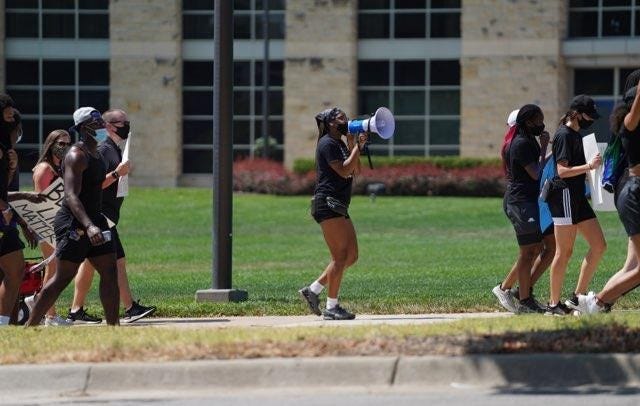
Chandler Prater (center) leads the crowd in protest on the campus of Kansas University on Friday. (Photo courtesy of Kansas Athletics)
The players called in the coaches and told them how they felt. “It was heavy,” said head coach Brandon Schneider. “In those situations, I try to do a lot of listening.” After several players shared their perspectives, the dialogue shifted towards action.
“We wanted to send a message that KU is gonna be unified, and we're not going to be silent about what's going on,” Prater said. “We wanted to take action — as a community, as a school, as student-athletes — as soon as possible.”

Some players brought up the idea of having a march the next day. The rest of the team quickly agreed and turned the focus to the logistics. “We began to realize, ‘Hey, there's a lot of things that have to happen in a very short period of time for us to have this when [we] want to have it,’” Schneider said.
The team sprung into action. Practice was canceled, and players went to the store to purchase posters and other materials to make flyers. With the help of KU Leads, Kansas’ student-athlete leadership organization, the team rushed to secure a permit to hold the march the following afternoon — a process that typically takes several days, according to Schneider.

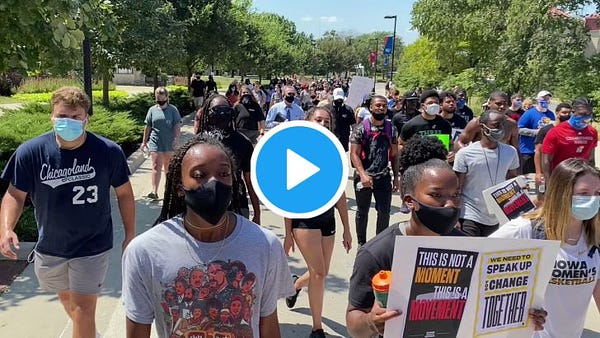

“I credit our administration and others on campus for acting so swiftly and supporting it,” Schneider said. “And I think that's just a real reflection [on] our players — the influence and the voice that they do have.”
With such short notice, the players weren’t sure how many people would show up. “We had no expectations for it,” said senior Bailey Helgren. “We told each other we would march [even] if it was just our team.” But soon other Kansas athletes learned of the event, and then word spread to the community. By 1 p.m. on Friday, people from far beyond campus had heard. “People around Kansas were driving hours to come to Lawrence because they've been waiting for the community to do something,” Helgren said. “It was just really cool to see the community to show up and know that there's a lot of people who want to fight for this and that care about this.”
The march began outside of university-owned apartments with some of the players addressing the crowd. The protesters then walked three miles through campus over the course of an hour to the football field at David Booth Kansas Memorial Stadium, where participants — including athletic director Jeff Long and head football coach Les Miles — took a knee during a moment of silence.

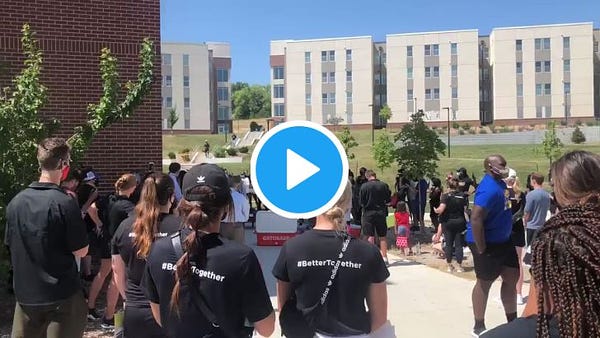
“To see the numbers was really inspiring,” Helgren said. “It was just really cool that we could spark something here.”
That spark came from a flame that professional players fanned last week. "After we saw the NBA and the WNBA and their T-shirts and the action that they were taking after Jacob Blake, I think that just added fuel to the fire for us,” Helgren said.
“We definitely felt empowered by them,” Prater added.
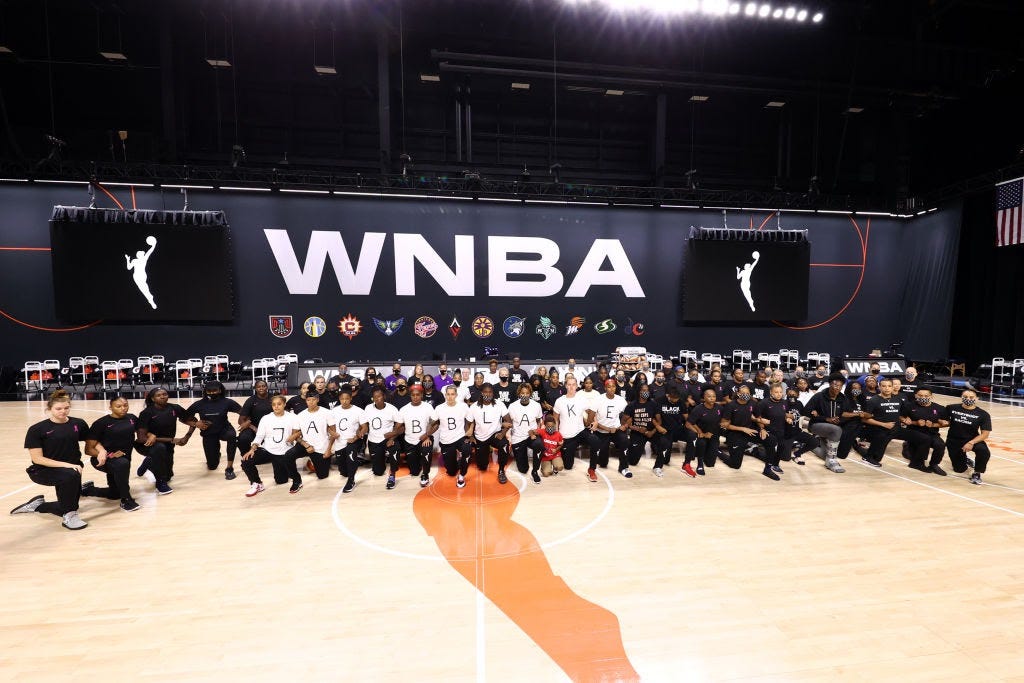
The Washington Mystics honor Jacob Blake with T-shirts and kneel with other WNBA teams after deciding not to play basketball on August 26. (Photo by Ned Dishman/NBAE viaGetty Images)
WNBA players have made it a point to lead by example during this season dedicated to social justice. “To the younger generation, [we’re] continuing to show them what we can do — show them that even if you’re a basketball player, you’re a human being,” Seattle Storm forward Breanna Stewart recently told the media. “There’s more to life than basketball.”
For Prater, as it is for far too many people of color, the cause is personal. “[My family and I] have had experiences [with police brutality],” she said. “The sad part about it is, I feel like a lot of my family doesn't feel the need to go into detail about specific experiences because it has just become the norm.”
Prater is grateful for the support of Helgren, Schneider, and the rest of her white teammates and coaches. “It's their support that's really going to drive us forward,” she said. “Obviously, members [of] the Black community and other minority communities are definitely going to support this movement because we are the ones being affected, but once we have the majority, such as my white teammates [and] my white coaches … behind us, that's when I feel that we're really gonna make some [head]way.”
“We're all family, and [our teammates of color] know we have their back,” Helgren added. “We'll be there whenever, wherever to fight for them.”
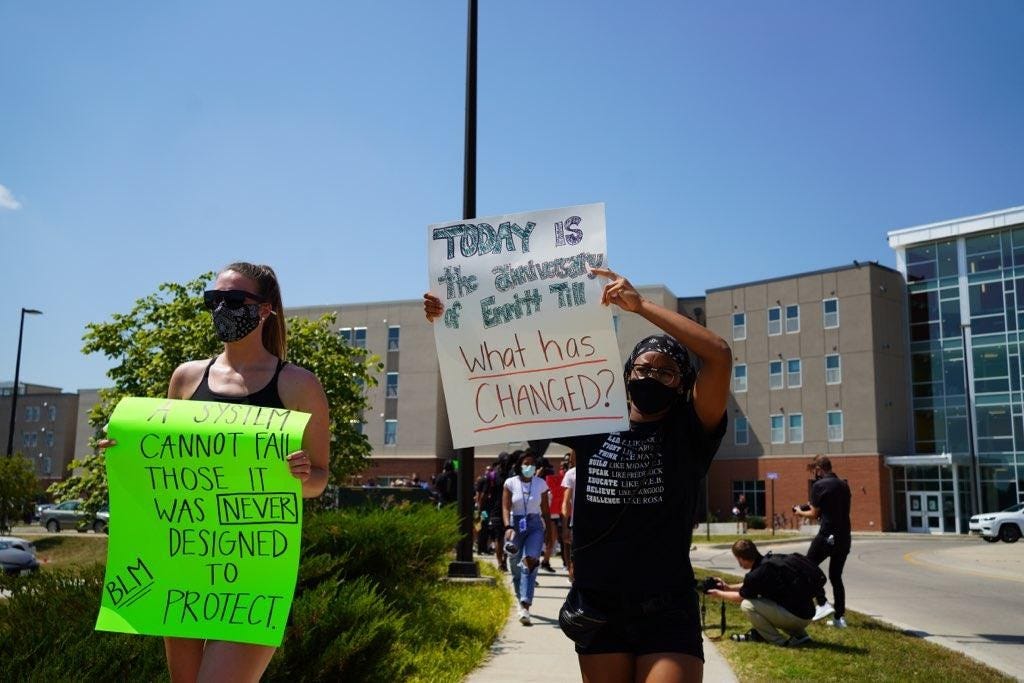
Helgren (left) and Prater display their signs at their team’s march on Friday. (Photo courtesy of Kansas Athletics)
The march was an important display of unity and support for the Black community, but the players’ fight for justice won’t stop there. “Doing something [on] one day is not what they want to be about,” Schneider said. “They’re looking forward to continuing to use their platform and their voice.”
The team is having ongoing discussions about how best to do that. One key objective has been registering and preparing to vote, which is something Schneider will encourage his players to do by not holding practice on Election Day. “We did take an initiative to make sure all of our players were registered to vote in their respective states,” Schneider said. “[We wanted to] make sure that they had our full support and then make sure they had resources to educate themselves on various politicians that might be in their communities and in their states — not just the national election — that may align with their values and their beliefs.”
“Our athletic department as a whole has done a really good job making sure that all of our student-athletes get registered to vote [and] that we understand the voting process,” Prater said.
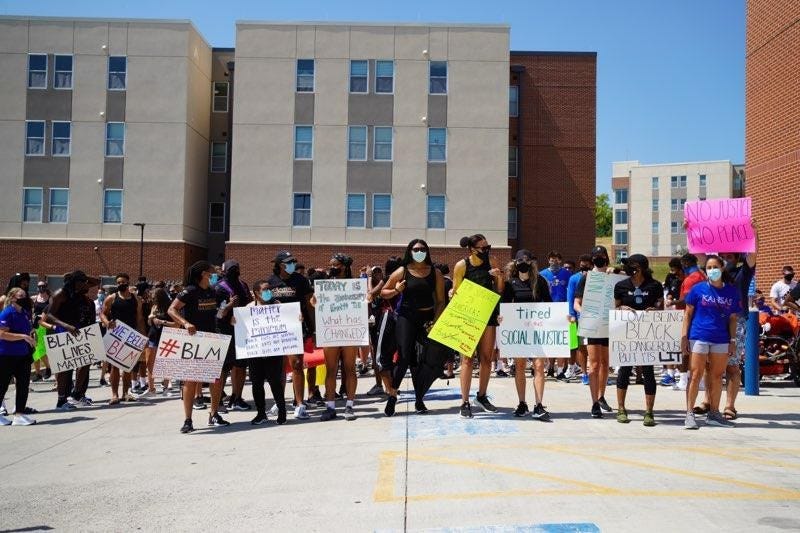
Kansas women’s basketball players and coaches join their community in protesting police brutality on Friday. (Photo courtesy of Kansas Athletics)
The team also hopes to emulate the pro leagues in making on-court statements. “We're really inspired by the NBA and the WNBA — how they have their statements on the back of their jerseys,” Prater said. “We would love to have that at the NCAA level.” Every WNBA player this season wears the name of Breonna Taylor, a Black woman who was murdered by the police in March while sleeping in her own home, on the back of their jersey. Since the NBA season resumed in July, most NBA players have added personalized social justice messages to the back of their jerseys as well.
“In terms of [messages on] warmup shirts too, I'm sure we'll do that,” Helgren added. “Anything we can just to keep the conversation going so people can't ignore it anymore — they have to see it and hear it.”
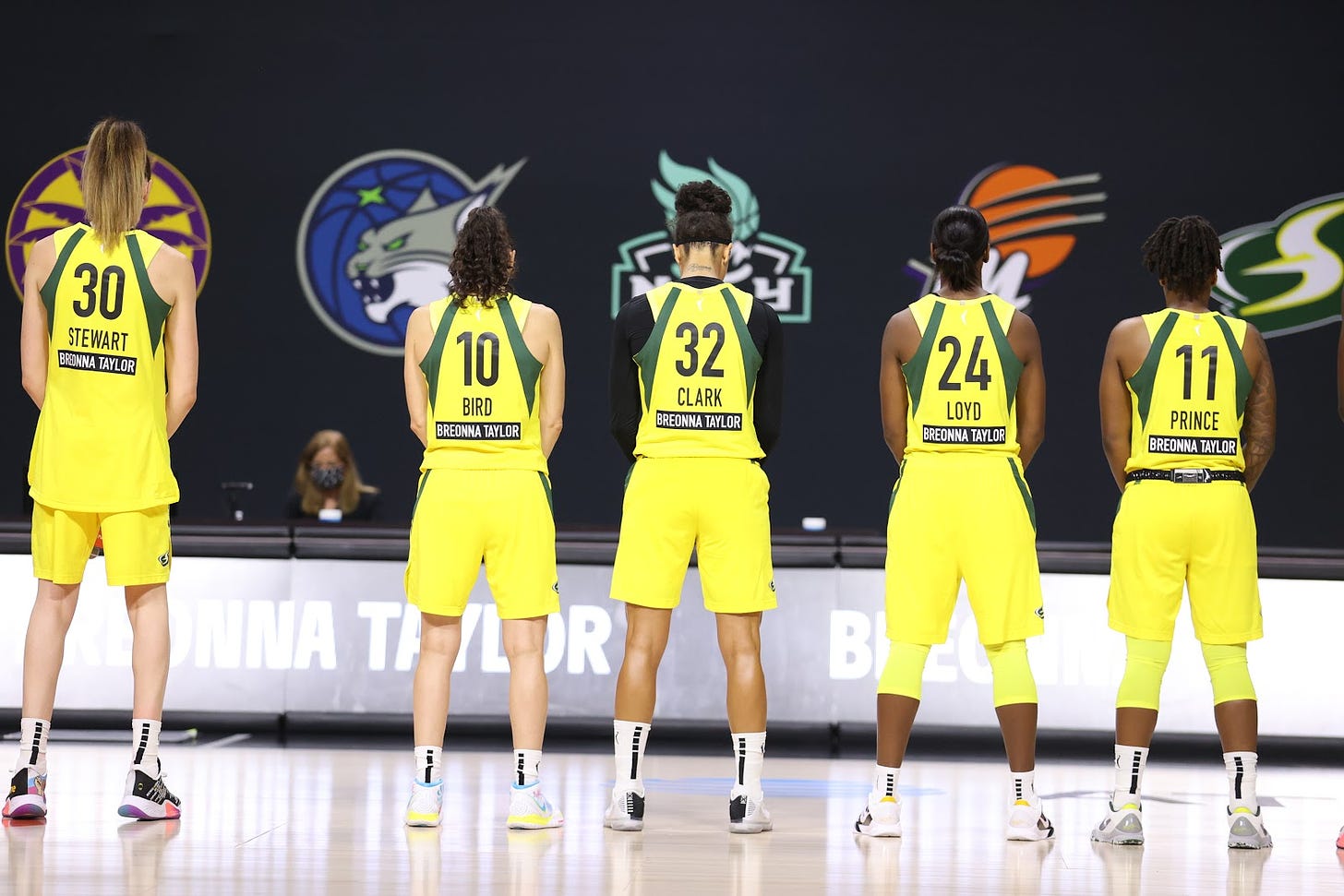
Breanna Stewart and her Seattle teammates recognize Breonna Taylor with a moment of silence before their season opener on July 25. (Photo by Stephen Gosling/NBAEvia Getty Images)
The rise of athlete empowerment has been one of the biggest sports stories of 2020, and as the push for social change gains steam, women’s basketball continues to lead the way. More and more athletes are stepping up and making their voices heard and, as Prater puts it: “KU is here. KU is a part of the movement.”
Thanks for reading the Her Hoop Stats Newsletter. If you like our work, be sure to check out our stats site, our podcast, and our social media accounts on Twitter, Facebook, and Instagram. You can also buy Her Hoop Stats gear, such as laptop stickers, mugs, and shirts!
Haven’t subscribed to the Her Hoop Stats Newsletter yet?



